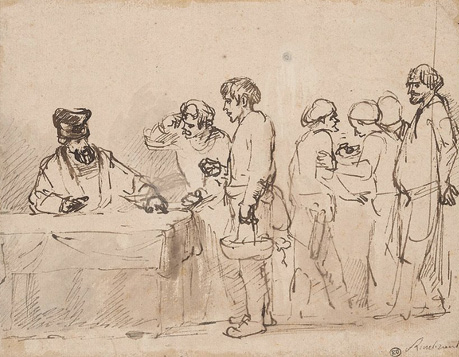Before reading on, take a moment to read the Parable of the Laborers in the Vineyard in its entirety (Matthew 20:1-16). Having done so, can you determine the singular truth that your Savior was communicating in the parable? If your answer is “Salvation is by grace alone” you would, of course, be right. Yet if that was the sum and substance of what Jesus wanted to teach us in the parable, why didn’t he just say, “Salvation is by grace alone”? Why the parable? Why the story? Because the parable adds depth and contour. It creates a story that not only teaches a central truth but that does so in a way that is both memorable and applicable.
The occasion and target audience of this particular parable are vital pieces of information. It was delivered by Jesus in response to a rather typical pre-Pentecost question from Peter: “See, we have left everything and followed you. What then will we have?” (Matthew 19:27 ESV) In the question we hear echoes of “Will you at this time restore the kingdom to Israel?” (Acts 1:6) and “Grant that the two of us might sit, one on your right hand and the other on your left.” The parable was therefore not directed to wicked tenants or unforgiving servants. It was directed immediately to Peter and the other disciples, and therefore indirectly also to every Christian that would follow. This context is the steering wheel that keeps us out of the ditches that border our Savior’s intended path.

The workers in the parable are not divided into five groups (those who began work at 6:00, 9:00, 12:00, 3:00, and 5:00) but two (those who contracted with the master of the house and those who did not). That was not the only distinction that separated the two groups. Only the first group complained about their wages and only the first group was rebuked and sent away by the master. All the other workers trusted the master to do what was right. None complained and none were sent away.
But what was the “wage”? Commentators have differed on this point, some seeing the wage as eternal life, some as temporal blessings, some a combination of the two. One thing we know—no one earns his way into God’s paradise. Nor is it conceivable that any true Christian would complain about receiving heaven, as did the first workers, or that any true Christian would be dismissed from the master’s presence once the wage was received. For these reasons, the wage might best be understood as earthly provision. Remember that the parable was Jesus’ response to Peter’s question: “See, we have left everything and followed you. What then will we have?” The Master has promised to provide for the earthly needs of his children, his workers: “But seek first the kingdom of God and his righteousness, and all these things will be added to you.” (Matthew 6:33 ESV) He has thus “contracted“ with his workers to provide for their needs when they are engaged in his service, and those earthly blessings include far more than the basic necessities. What blessings are showered on God’s children working alongside other Christians—mutual support and encouragement, correction when erring, comfort when grieving, support when weak, caution when strong!
All these temporal blessings Peter and the other disciples were told they could expect, but they came with an all-important warning: Do not imagine that you in any way earn or deserve heaven because of your work in the church. Eternal life is an undeserved gift. The first workers represent those who lose sight of this most basic Christian truth. They were sent away (became “last”) because they rejected God’s grace, imagining that they had earned more than God’s promised earthly provision. The word translated as “friend” in Jesus’ address to them does not indicate affection. It was the word He used to address Judas in the Garden of Gethsemane and the man without a proper wedding garment in that parable.
Christians are thus both encouraged and cautioned in this parable. We can spend our lives in joyful service to our Lord, fully confident that He will provide for our earthly needs. Yet no one, be he a lifelong Christian or an eleventh hour convert, earns his way into heaven. Jesus earned that, and He gives it to us as a testament to His undeserved love.
is pastor of Saint Paul Lutheran Church in Bismarck, North Dakota.


